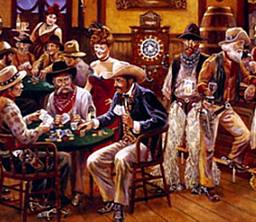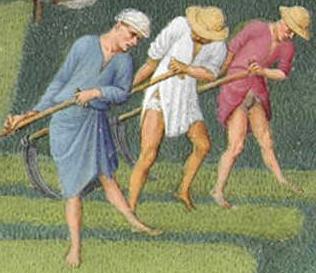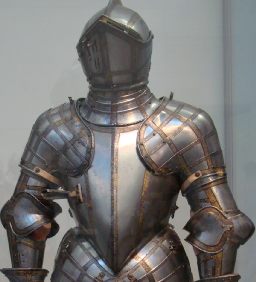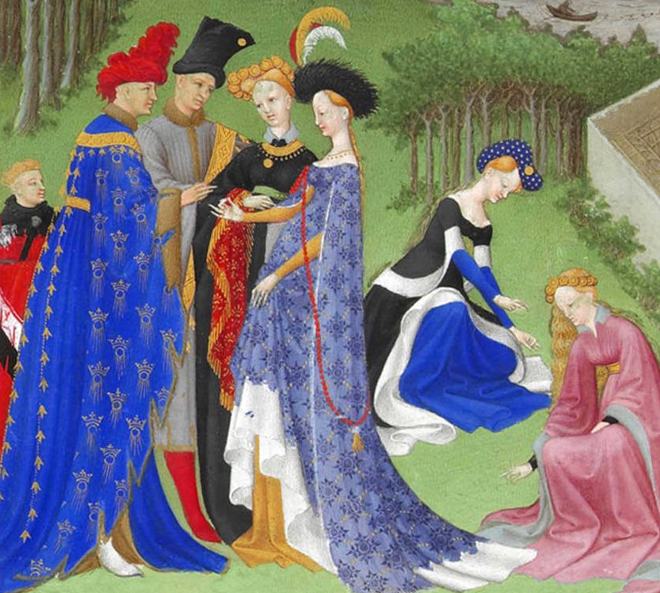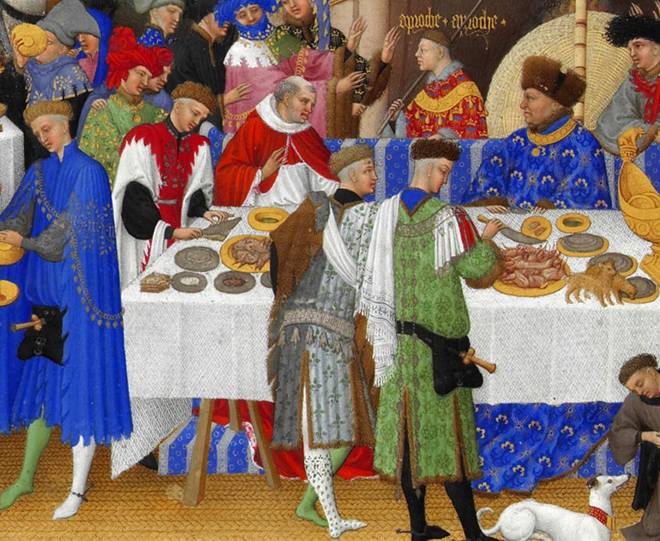| The man and woman are not
wearing
underwear, and they are doing something that would be considered perverted
today, and possibly illegal. They
would
be described as "exposing themselves".
In the painting for August, and in many other paintings
from centuries
ago, people would swim naked in rivers, or wash themselves naked.
Bathing
suits, especially for children, were rare.
Why were people in that era more tolerant of nudity? Was
it simply
because they had grown up around nudity?
|
|
 |
Have attitudes towards nudity
changed?
There is an isolated beach in my city where some
people will
go to be naked. The police cannot drive to this beach, so sometimes
they
travel by horse to arrest some of the people who are naked. Nobody
centuries
ago would have been arrested for being naked in an isolated area, so
why
do Americans send armed adult men on
horseback to arrest people in an isolated
area who are simply naked?
 But wait! Before you answer that question,
keep in mind that
while these armed men are arresting naked people at an isolated beach,
there are thousands of businesses and advertising agencies that are
sexually
titillating both adults and children in
television shows, advertisements, movies, songs, and magazines in order
to sell products. Furthermore,
there
are businesses profiting from beauty pageants in which young girls look
and behave like miniature prostitutes! But wait! Before you answer that question,
keep in mind that
while these armed men are arresting naked people at an isolated beach,
there are thousands of businesses and advertising agencies that are
sexually
titillating both adults and children in
television shows, advertisements, movies, songs, and magazines in order
to sell products. Furthermore,
there
are businesses profiting from beauty pageants in which young girls look
and behave like miniature prostitutes!
So, how do you explain
our intolerance
of harmless nudity but the
acceptance
of constant sexual titillation,
some
of which is bordering on child pornography?
 But wait! Before you answer that question,
consider that we
allow obnoxious toilet humor on
television,
movies, advertisements, and artwork. But wait! Before you answer that question,
consider that we
allow obnoxious toilet humor on
television,
movies, advertisements, and artwork.
| Have you seen this
artwork of Jesus that was put in a church in Oklahoma? How about the "Suri
Cruise Bronzed Poop"? |
|
How about this
CNET news article about Stephen Hawking's ideas on aliens? Is that your
idea of selecting a photo that fits the article? |
|
The toilet humor in children's cartoons is often
explained as due to
sloppy drawings, such as this Bugs Bunny scene, or this
priest in The Little Mermaid. |

|
|

|
|

|
So, now how do
you explain
our sexual attitudes?
 But
wait! Before you answer that question, consider that we
allow
"subliminal messages" in
advertisements
and cartoons (this
video shows some). It doesn't matter whether subliminal messages are
actually
altering our attitudes. The issue we should think about is: Why
do we tolerate people who are trying to manipulate us with subliminal
messages? But
wait! Before you answer that question, consider that we
allow
"subliminal messages" in
advertisements
and cartoons (this
video shows some). It doesn't matter whether subliminal messages are
actually
altering our attitudes. The issue we should think about is: Why
do we tolerate people who are trying to manipulate us with subliminal
messages?
So, now how do you
explain our sexual
attitudes?

 But
wait! Before you answer that question, consider how we ignore
all of the evidence that Congressman Barney Frank and other influential
men are routinely raping orphan
boys
all throughout America and Europe, and some men are purchasing children
as sex slaves. And nobody seems to
care that Josef Fritzl may have been just
one of many members of a pedophilia
network. Some people complain about the molesting of
children
in the Catholic Church, but they seem more interested in profiting from
it than in stopping it.
But
wait! Before you answer that question, consider how we ignore
all of the evidence that Congressman Barney Frank and other influential
men are routinely raping orphan
boys
all throughout America and Europe, and some men are purchasing children
as sex slaves. And nobody seems to
care that Josef Fritzl may have been just
one of many members of a pedophilia
network. Some people complain about the molesting of
children
in the Catholic Church, but they seem more interested in profiting from
it than in stopping it.
So, now how do you
explain our intolerance
of harmless nudity and our acceptance
of manipulation, abuse, constant sexual titillation, borderline child
pornography,
toilet humor, raping of children, and sex slaves? When I was a
teenager,
it seemed to me that our attitudes were backwards.
What about you? Who do you
think should the police arrest?
a) The naked people at isolated beaches.
b) The people in our media, government, schools, advertising agencies,
churches, and businesses who produce or promote toilet humor, or who
use
sexual titillation or subliminal messages to manipulate us, or who are
involved with pedophilia or sex slavery.
I'm not
advocating nudity
Years ago I was riding a bicycle on a hot summer day,
and the
bike path passed by a small river, and some areas were deep enough to
go
swimming. I was getting so hot that I couldn't resist the desire to
jump
in the water, but I didn't have a bathing suit. So I stopped near an
area
that was somewhat isolated, took off my clothes, and jumped in the
water.
When I got out I had to stand naked in the sunshine for a while in
order
to dry off. It's possible that somebody saw me and called the police,
but
the police would have arrived after I was gone.
I'm not advocating public nudity or nudist colonies.
Actually, I pointed
out in part 2 of my social
technology
articles that there are sensible reasons to prohibit nudity in
buildings.
However, when people are outdoors and want to go swimming in a river or
lake, and if they don't have a bathing suit, what
is the problem with them doing so naked?
Historians could help us
understand
the Victorian era

I discussed the attempt by feminists to change our
attitudes
in Part 2 of my
Dumbing Down articles
so I won't repeat myself, but to summarize it, when I was a child,
there
was a nationwide campaign by feminists to change our attitudes. For
this
article, I'd like to point out something I didn't mention before,
namely
that we were told that women during the Victorian era (about 1837-1900)
were miserable because of the extreme prudishness of the era. We were
shown
drawings of women at the beach completely covered in elaborate
Victorian
swimwear (more drawings are here).
Why would anybody want to swim while dressed in such clothing?
I also remember being shocked to hear the feminists complain
that Victorian
women were not supposed to enjoy sex
or have orgasms.
At the time, I and other children assumed that the feminists
were telling
us the truth, just as we assumed we were told the truth about the Nazis
killing 6 million Jews. However, once you realize that people in the
media
and schools routinely lie to us, we
should demand evidence that a significant
number of women during the Victorian era were swimming in those
costumes,
and that women were truly trying not to enjoy sex.
Furthermore, we need to know why
women were wearing those costumes at the beach. Was it because men were
forcing
them to do so? Or were only wealthy women wearing that elaborate
clothing
at the beach, and were they doing so because they
wanted to?
Take a look at how women are behaving today.
A lot of the cruel and idiotic things that women are doing to
themselves
are self-inflicted. For example,
although
a lot of men promote high-heeled shoes, there are also a lot of men
telling
the women to stop it. However, the women don't support the men who
oppose
these shoes; rather; they ignore our complaints and torture themselves
in those shoes.

The situation is so ridiculous that women are even dancing
on television while wearing high-heeled shoes. If you are a man, it
might
be easier for you to understand how ridiculous the situation is if you
imagine
yourself wearing high heeled shoes during extremely difficult physical
activities. Would you tolerate it?
How ridiculous does the situation have to get before women
complain? What if the female gymnasts, tennis players, and swimmers
were
wearing high heeled shoes?
Some women also get breast implants even when their
boyfriend or husband
doesn't want it. Did you listen to Mel Gibson insult his ex-girlfriend
for getting breast implants while she was nursing
her baby?
If women had more sense, they would support the men who
encourage better
behavior from both men and women. Unfortunately, most men and women
behave
like stupid animals. A lot of the suffering that is going on in this
world
- by both men and women - is self-inflicted. In
some cases, such as with high-heeled shoes and other clothing issues,
people
are doing what everybody else does. The only way Americans are going to
switch to the metric system, or stop wearing high heeled shoes, or stop
referring to a pair of pants as a "pair", is if we get real leaders who
force these changes on the nation. The people are not going to make the
changes voluntarily or willingly.
Of course, if there are people who want to implement my idea
of building
some completely new cities, then we can bring these changes to the new
cities and ignore everybody else.
The point I want to make is that if historians were honest,
and if they
had access to adequate documentation, they could help us understand the
Victorian era and resolve such issues as whether women were suffering
from
"sexism". And real historians would be valuable in helping us to decide
what we want for our future.
Our interpretation of a
society
depends on who
we analyze

In every group of animals, plants, and people, we
will find
that some are doing wonderful, some are on the verge of death, and most
are ordinary. Therefore, when we
analyze
animals or humans, we have to look at a large,
random sample or we will end up with a distorted view. For
example,
as I mentioned here
in part
4 of my Dumbing Down articles, if we were to judge Ireland according to
the immigrants to America about a century ago, we would assume that the
primary food in Ireland was the potato, and that everybody was on the
verge
of starvation.
For another example, when I was a teenager I met a couple
from Greece,
and when I asked them why they moved to America, they said it was
because
there were no jobs in Greece. I visualized a Greek newspaper in which
the
section for employment opportunities was almost completely empty.
If the earth had been covered with video surveillance
cameras for the
past few thousand years, we would be able to get a very accurate
understanding
of human life and history. For example, we would be able to analyze
everybody
in Ireland during the potato famine, and that would allow us to
determine
who among them depended upon potatoes as their primary food. We would
have noticed
that some of the Irish people had plenty
of food to eat because potatoes were a small part of their diet. We
would
also have noticed that some potato crops were doing fine.
And if we were to look at Greece, we would have found that there were
jobs all
over the area.
Unfortunately, since we don't have video surveillance of
previous generations,
the only way we can determine what life was like centuries ago is to
analyze
what the people left behind, such as their paintings, books, music, and
material items. However, we have to be careful making assumptions based
on that limited information because it may not reflect all
of society. One artist, for example, may paint pictures of wealthy
people,
whereas another artist may prefer to paint the poor people, the
beggars,
and the drunks. In such a case, neither of those two artists would be
giving
us adequate information about society. An artist would have to paint
the
"ordinary" people and their "ordinary" activities in order to give us a
good idea of what was going on. In fact, the reason I selected that
group
of 12 paintings in Très
Riches Heures is because they appear to be showing ordinary scenes
from ordinary life.
Imagine future
generations judging
us by our "official" image
Since you are reading my
articles, you probably already realize that the American and European
media
is promoting propaganda about the 9/11 attack, the Holocaust, and
thousands
of other events. And you probably realize that my
opinions are available to you only
because of the Internet, and that the people who dominate the world
right
now do not want to give me or my opinions any publicity. Even the
people
in the so-called 9/11 "truth movement" have become so frightened of me
that they no longer give me publicity. If it were not for the Internet,
you wouldn't even realize that I existed. Instead, you would know about
Kieron Williamson's
ordinary - or priceless - paintings.
Keeping the value of the Internet in mind, imagine if the
Americans
had gone into a wild frenzy after the 9/11 attack and inadvertently
triggered
a world war that caused so much destruction that the world reverted to
a primitive existence, similar to the Middle Ages. In such a case,
centuries
from now, historians would try to figure out what happened by looking
at
the information we had left behind in newspapers, television, and
history
books. It should be obvious that they would end up with an incredibly
distorted view of life in our era. For example, they would
come
to the conclusion that the Nazis had killed 6 million Jews, and that
the
Muslims were terrorizing Europe and America, and that most intelligent
scientists were convinced that humans were causing the planet to become
warmer, and that the solution was to impose carbon taxes. They would
also
believe that we had put men on the moon six different times, and that
Al
Gore and Barack Obama won the Nobel prizes because they were two of the
most intelligent men of our era.
Those future historians would eventually figure out that we
lied about
the Apollo moon landing, but it's possible that there wouldn't be
enough
information available for them to figure out who was truly responsible
for 9/11, or that the Jews were lying about the Holocaust.
If it were not for the Internet,
we would be in big trouble
The Internet is allowing me to circumvent the
censorship around
the world, and this brings up some very important issues:
1) Why should we trust any
historical document?
There may be millions
of news reporters,
history professors, government officials, scientists, and other people
lying to us right now about the
9/11
attack, the Holocaust, the Apollo moon landing, and global warming. It
doesn't matter whether those people are lying because they
want to or because they're afraid
to tell the truth. The lying is so extreme and
so extensive that we ought
to wonder, how many years has this
disgusting behavior
been occurring? Were the news reports, history books, and other
documents
that were created in America around the 1700s also full of lies and
propaganda?
Were people during the Middle Ages also putting propaganda into their
documents?
There are official documents from government agencies,
universities,
and scientists that prove that that Nazis killed 6 million Jews, and
that
astronauts landed on the moon. Since we cannot believe the official
documents
of the past few decades, why should we believe the official documents
that
were created centuries ago? Is there any propaganda in the ancient
Greek
and Roman documents? What about the hieroglyphics that the Egyptians
left
behind?
I suspect that the propaganda increased by a significant
amount once
the Zionist movement became officially established in 1897, but
organized
crime networks have been in existence in many nations for centuries,
and
individual people have been lying ever since people have existed.
Therefore,
the best policy to follow is to be suspicious
of all documents and try to verify all information.
This concept also applies to the documents from churches.
The Catholic Church, the Mormon church, and other churches are doing absolutely
nothing to expose the lies about 9/11, the Holocaust, etc.,
and many churches are involved with pedophilia, or the making of money.
We have to consider that this type of disgusting behavior has been
going
on with churches for centuries. Furthermore, it's possible that the
early
churches were even more disgusting
than they are today because centuries ago it was difficult for people
to
see what was actually going on in the churches. Therefore, the churches
may have been even more of a refuge for freaks than they are today.
2) How many people have been suppressed
and murdered?
The entire world is under attack by a network of freaks,
most of whom
refer to themselves as "Jews". As with all criminals, and they cannot
beat
us in fair competition, except perhaps in a few areas, such as
boxing,
and possibly some areas of math. Their methods for achieving success is
to murder their competitors, or
marry
people who are successful, or suppress us
in some other manner, such as kidnappings, blackmail, and damaging our
bodies (such as breaking the legs of athletes). It makes me wonder how
many people have already become one of their victims. How many
wonderful
people have they killed, kidnapped, or suppressed? How much damage have
these disgusting criminals done to the human race? What would life be
like
today if our ancestors hadn't been so tolerant of crime, monarchies,
and
nepotism?
The leaders of an
organization are
never "typical"
An ordinary
person will never
win the Olympics, or be elected to a government office, or do anything
unusual. He will live a very ordinary life. If a person
achieves
something that's unusual, his achievement is proof that there is
something
unusual about him.
This concept may seem obvious, but the American people don't
seem to
understand it. For example, the attitude in America is that "ordinary"
people are capable of becoming president because we have a fair and
honest
democracy. However this concept doesn't make sense. The idea that an
ordinary
person can become president is as idiotic as the idea that an ordinary
person can win the Olympics, or that an ordinary person will be among
the
best carpenters.
After Ronald Reagan was elected president, I heard some
Americans boast
that Reagan was proof that ordinary people can become president of
America.
However, Reagan was not ordinary.
There
is evidence that he was assisted by the gigantic crime network of Jews
who were trying to get the Bush family into the presidency, but George
Bush didn't appeal to enough voters, so they used Reagan to attract
people's
attention. Reagan was a puppet of
a
gigantic crime network, not an "ordinary" person.
An ordinary person will never
get
into a top leadership position. Ordinary people live ordinary lives.
It's
one of the rules of life that you can't beat. The leaders of a
nation
will always be "unusual" people. They will be ordinary in some
qualities,
but there is something unusual about them. Ideally they are unusually
good at leadership, but during the past few centuries it
seems
as if most (or all?) of the men who have risen to the top in society
have
achieved their success because they are puppets of a crime network, or
because they inherited their position, or because they excelled at
manipulating,
frightening, intimidating, bribing, murdering, lying, or deceiving.
Our natural tendency is to assume that the leaders of an
organization
are better than their members, and this was certainly true during
prehistoric
times. However, the people who are getting control of nations today,
and
who are getting control of churches, charities, think tanks, and
schools,
are not desirable people. They
seem
to be involved with crime networks. They also seem to have extreme
cravings
for fame, material items, and pampering by servants. Therefore, we have
to be careful judging an organization according to the behavior of the
people in leadership positions.
The Catholic Church might be a simple example to explain
this concept.
The Catholic church officials are not "ordinary" men. There is
something
unusual about them. First of all, they are religious fanatics, and
secondly,
they are much more involved with homosexuality and pedophilia than the
members of the church. Therefore, the church officials do not represent
the members of the church, so we cannot understand the lives of the
members
by looking at the behavior, friends, or relationships of the church
officials.

Consider how this concept applies to the feminist
movement.
For example, the feminists claim that women were miserable
during the Victorian era, and that they weren't
allowed to enjoy sex, but I suspect that if there had been
video
surveillance in everybody's bedroom, we would discover that most women
were living the same type of life as their ancestors. I think the
strange
sexual attitudes of the Victorian era were coming from the weird
people in leadership positions, not
the ordinary people.
It's possible that the reason the Victorian era developed an
image of
prudishness and of women who never enjoyed sex is because the men who
rose
to top leadership positions during that era may have been very strange.
For example, some of them may have been too selfish or neurotic to
satisfy
a woman sexually, and some men may have selected a woman according to
the
political benefit her family provided him, in which case there may not
have been any affection between them.
Furthermore, according to Kay Griggs,
a lot of our top military leaders are homosexual,
and they get married in order to create the
illusion that
they are heterosexual. This idiotic situation may have occurred during
the Victorian era, also. In such a case, some of the women may have
been
married to homosexuals, and the women may not
have realized it! The homosexual men may have hid their
homosexuality
by promoting the theory that women shouldn't enjoy sex or have orgasms.
If that seems like a crazy possibility, consider that the Catholic
Church
promotes the attitude that church officials should never get married. I
suspect that they created that rule simply to hide their homosexuality
and keep the heterosexual men out of the church.
For another example of this concept, Barney Frank is a
congressman from
Massachusetts, but we wouldn't be able to understand the lives of the
people
in Massachusetts by looking at his
life and relationships.
The point I'm trying to make is that when the feminists
complain about
the Victorian era, or the Puritans, or any other group of men that
seems
abusive to women, we have to keep in mind that those men may be a very
small group of very weird men.
The feminist movement is
nonsense
Some aspects of the feminist movement appealed to me
as a child,
such as the concept of girls becoming more sexually active. However, as
I grew up I began to notice that the feminist attitudes were idiotic
and
unrealistic. For example, I eventually encountered women who were
raped,
or who weren't 100% certain who the father of their child was, and I
noticed
that they really were the low
quality
women. From my own casual observations, most of the women who have been
raped were raped by men that they associated
with.
The reason for this is very simple. People tend to associate with
people
that they have something in common with. Women with mental disorders
tend
to associate with men who have mental disorders, and then the two of
them
have strange relationships. Also, women with mental disorders often do
annoying things that cause men to lose their temper.
If America had been dominated by people like me, the
feminist philosophy
would have ended long ago. As I mentioned in my audio file for 14
December 2008, Sweden also went through a dramatic sexual
revolution
when I was a child. Why is Sweden continuing to promote this
philosophy?
Obviously, people like me do not dominate Sweden, either. So, what kind
of people are in control of our world?
I would describe
American sexual
attitudes as "childish"
I was most "sensitive" to sexual issues somewhere
between the
ages of 10 and 14. At that time I was easily embarrassed by nudity and
sexual issues, and I was also attracted to, and stimulated by, the
sexual
titillation on television and in advertisements. I also enjoyed "toilet
humor", and I was impressed by the intelligent
material in television shows, magazines, and newspapers. Even the
advertisements
seemed intelligent.
However, as I grew up, I lost my interest in toilet humor,
and I became
much less embarrassed by sexual issues. The constant sexual titillation
became annoying, and television and other media seemed idiotic and
obnoxious.
I also lost my embarrassment of nudity. I was even more confused by the
total lack of information about childbirth. We are allowed
to
observe animals give birth and nurse their babies, but we are not
allowed
to observe human women give birth or nurse their babies. Why not?
Furthermore,
we allow toilet humor about childbirth,
such as this
idiotic statue of Britney Spears giving birth while on her hands and
knees.

The attitudes in America towards sexual issues remind
me of
my own attitudes during my early teenage years. At that age it would
have
been impossible for me to have a
calm
discussion about childbirth, masturbation, or any sexual issue. I would
have giggled, become embarrassed, and felt extremely awkward. It seems
as if the human mind, at least boys, go through some type of changes
during
our teenage years that makes us very sensitive to sexual issues.
By my late teenage years I was so disgusted with American
society that I decided to never get a television set, or purchase
magazines
or newspapers. I wanted to avoid American society, not become a member
of it. It felt to me as if the people who dominate America were at the
emotional level of a child; as if they had never completely matured.
They
reminded me of the time when somebody in my family put a cocoon in a
jar
so that we could watch it transform into a butterfly, but one of its
wings
didn't properly develop. I wasn't sure if we had damaged the cocoon in
the process of picking it and putting it into a jar, or if it was
defective
for some other reason. Regardless, the men who dominated America
reminded
me of that butterfly that didn't completely mature. We are dominated by
men who have the bodies of an adult, but they have the emotional
attitudes
of a teenage boy.
Who has a problem with nudity?

I think our sexual attitudes should be reversed. I
would get
rid of the toilet humor and the sexual titillation, and I would allow
people
to swim naked at beaches and rivers. I don't have any problem with
nudity.
Also, I don't consider naked children to
be sexually appealing. I think young girls are more appealing when
they are dressed as miniature prostitutes, and especially when their
photo
has been edited, as this one has. These visual images fool my mind into
thinking that I'm looking at a young, beautiful woman rather than a
little
girl who has been dressed like a prostitute and then edited
to appear even more beautiful.
Sure, the edited photo of that little girl is attractive,
but who
among us wants this kind of deception and manipulation? Why
should we allow businesses to profit from this type of photo editing? I
think we should stop this abuse,
but,
obviously, people like me don't dominate America. So, what kind of
people
dominate America? What kind of people will complain about somebody
who is naked at an isolated beach while enjoying toilet humor and
constant
sexual titillation? That particular attitude reminds me of when I was
12 to 14 years
old.
If we were to reverse our sexual policies and allow nudity
at beaches
and rivers, there would probably be a lot of incidents in which men
have
trouble controlling themselves around the naked people. Children might
complain that they are being stared at, or touched, and women might
complain
that men are brushing up against them or making lewd remarks. Most
people
would react to the abuse by wanting to bring back the policy of
prohibiting
nudity, but as I mentioned in part 2
of my social technology articles in which I complain about providing
separate
beaches or trains for women, we shouldn't change society to fit the
badly
behaved people. Rather, we should design society for the high quality
people,
and remove the people who can't fit in.
What is different
between me
and you?
If we had a database that had details of everybody's
lives,
we would be able to determine how similar we are to one another. For
example,
how many people besides me have tried to design their own clothing? Is
that unusual or typical?
For another example, when my mother was teaching me how to
use a toilet,
I was confused as to why there were so many pieces to it. There are
actually
just a few pieces; namely, a bowl, a seat, and a lid, but to my little
mind, it seemed like a lot of pieces because I couldn't understand the
purpose of the lid or the seat. I was wondering why we don't remove
those
apparently unnecessary pieces and sit directly on the porcelain bowl.
I wondered about the purpose of those pieces for months,
maybe years,
before one day I became so independent that I decided to find out if
they
are really necessary. I decided to sit directly on the porcelain bowl,
and if everything went fine, then I would proudly announce to my mother
that we don't need those plastic pieces. However, as soon as my skin
touched
the porcelain, I jumped up and understood the purpose of the plastic
seat.
Do I need to tell you that the porcelain is very cold, and that it is
not shaped
to fit our body, so the edges are uncomfortable? Or did you and most
other
children also do this same experiment?
I made a very sloppy
centrifugal
fan
One silly project I did as a teenager that I don't
think many
other people have done is when I became fascinated with gas turbines
and
jet engines. I wanted to build my own jet engine. However, I didn't
have
the slightest idea how to design the curvy turbine blades, and there
was
no possible way I could have manufactured such a thing even if somebody
gave me the blueprints, but I was so fascinated that I decided to make
a simple centrifugal fan (like
the
black fan in the photo below) by cutting the pieces from a steel, Almond
Roca can and welding the pieces together.
| Since I knew that I couldn't possibly create a fan that
had any value,
I didn't want to waste too much of my time, so I didn't bother trying
to
draw anything on paper, or even measure any of the components. I
wouldn't
have known what to draw or measure anyway. And I wouldn't have known
how
to do the math that was necessary to design the fan.
I decided to create this fan visually with an acetylene
torch. I cut
the bottom off the can, slit the cylindrical part of the can, and
flattened
it so that I had some metal to work with.
My plan was to cut the parts with an acetylene torch
according to what
looked visually accurate, and then weld the pieces together.
As I look back at this now, I can't help but laugh. It
seems like a
joke. But there was a reason I wanted to do it, as I'll explain later.
|
|
 |
I started cutting blades visually
according to what I thought they should look
like.
However, I didn't have a cutting tip that was small enough to cut such
thin steel, so I used a welding
tip,
which creates very sloppy cuts. Droplets of steel would collect along
the
edges. Some droplets were larger than I was expecting, and the cuts
were
sloppier, also, so I could see that the fan was going to become much
worse
than I had imagined, but I kept going anyway.
After cutting the pieces that I wanted, I used a grinder to
get rid
of some of the large drops of steel, and to smooth out some of the
rough edges.
I didn't bother trying for perfection, however. Then I welded the
pieces
together. Unfortunately, I wasn't a good welder, especially not with
thin
steel, so it was a crummy job. But I kept going anyway. Eventually I
welded
all the blades together, although they didn't fit very well because
each
was a slightly different size and shape, and my welding was terrible. I
can still faintly remember what it looked like. The Almond Roca can was
pink on one side, and the torch burned the pink paint along the edges,
so the components were pink on one side, bare metal on the other, and
black
along their edges. So the completed fan had a lot of pink.
I attached it to a 3 hp electric motor, turned it on, and
was amazed
at how much it vibrated. However, it didn't destroy itself. And then I
tossed it in the trash.
I enjoy analyzing myself
You might wonder why I would bother making something
that I
knew would be worthless, and why I would do a sloppy job of it. One
minor
reason was that I've always wanted to do something when I was a
teenager. I didn't want to shop, or be pampered by servants, or sit in
a classroom. I wanted to make things and think about things. But the
main
reason I built that centrifugal fan was to get a better understanding
of
my mind and my thoughts. When I was a child I noticed that a lot of
what
I visualized in my mind was unrealistic.
For example, I could visualize myself picking up a pencil and then
drawing
a perfect circle on a piece of paper. But when I tried to draw a
circle,
I could never make one accurately. Obviously, I
couldn't trust my own thoughts. This was rather confusing,
and
a bit disappointing.
Also, as a child I had seen lots of cartoons in which the
characters
would cut up pieces of wood with no apparent effort, and then nail the
pieces together into elaborate houses or furniture. They made it look
very
easy. When I got older and my dad let me use a wood saw, I was amazed
at
how difficult it was to make accurate cuts, and that it was much more
effort
than the cartoons made it appear.
There were also many times during my childhood that I
discovered that
some of my brilliant thoughts were ridiculous. As a teenager I was
often
wondering which of the ideas in my mind are realistic, and which are ridiculous.
Sometimes I would do a silly experiment just to get a better
understanding
of my mind and my abilities.
In my mind I could easily
build
a jet engine all by myself, and one day I became so annoyed over the
issue
of whether these thoughts were realistic that I decided to put my
brilliant
ideas to a test by building a centrifugal fan just to find out if it
was
as easy as it seemed in my mind. In my mind I could pick up a torch and
cut blades out of a sheet of steel with incredible precision, but is
that
realistic? Or is my mind completely out of touch with reality? Could I
move my hands smoothly? And how long would it take to weld the blades
together?
In my mind I could weld the entire fan within a few minutes. And what
would
the welds look like?
We cannot trust our own
thoughts
These type of experiments may seem worthless, but
they helped
me to realize that my mind has no idea what
reality
is, and that I must
find
something to "connect" my thoughts to reality. These experiments also
helped
me to understand how people could believe in perpetual motion machines,
and why they would believe that they were capable of turning iron into
gold. These experiments also helped me to understand why millions of
apparently
intelligent people can believe in God, psychic abilities, devils, and
witches.
The human mind was never designed to understand the
universe. It was
designed to look for food, sleep at night, raise children, and then
die.
We were not designed to analyze the universe, create jet engines, or
even
develop software for computers. I design software for a living, but it
took years for me to get used to the stupidity of a computer and enjoy
this. A lot of the jobs we do today are not "natural" to us. The type
of
jobs that are natural to us are searching for food, and looking for a
hiding
place when something frightens us. It's not natural for us to spend
hours
a day trying to control a stupid piece of electronic equipment.
Our mind was never designed to deal with reality. Our mind
is so out
of touch with the real world that we can develop theories that don't
make
any sense, such as, the sun is being carried around in a chariot, or
that
there is an alternative universe in a fifth dimension. What is a "fifth
dimension"? How can a person develop a theory about "another dimension"
when nobody can explain what "another dimension" is? Obviously, the
human
brain is nothing but an advanced monkey brain.
I often became irritated with some of the thoughts I found
in my mind,
so I would conduct experiments to put some of my thoughts to the test.
This helped me to realize that the human mind has no inherent sense of
reality. We have to learn to be critical of our thoughts and look for
evidence
in the real world to support our brilliant theories. These experiments
also helped me to figure out what I like and dislike, and what I'm
capable
of, and what I'm not very good at.
However, I don't want to create the impression that I
conduct risky
or dangerous experiments. I did these experiments to understand myself,
not to risk death or find excitement.
I tried to fly like the Super-Heros

For another example of my idiotic experiments, when I
was a
preteen child, I wanted to fly like the Superheros in comic books
and cartoons, and when I climbed trees, I wanted to jump from one
branch
to the next. One day I thought to myself that maybe
I am actually capable of flying. I could fly in my mind... so... maybe
I could do it in real life! How would I know if I don't give it a try?
I decided to try, although I didn't have much confidence, so
I didn't
put much effort into it. I decided to run a few steps, and then jump
into
the air while throwing my hands up in the air like the superheroes. As
you might guess, I flew only a short distance. However, that simple
experiment
ended my curiosity about whether I could fly. That was one of the many
simple experiments that helped me to realize that my mind is out of
touch
with reality, and that I have to be very
careful believing
the thoughts that I find inside my mind.
This might seem to be an obvious
concept, but I'm not sure that many people have a good understanding of
it. An example are the scientists who develop detailed
theories about how the universe was created in a Big
Bang, or they come up with intricate details about an animal
or human based on a piece of a bone.

And have you heard of their idiotic concept of a wormhole?
Is this some type of intellectual humor? Or do some scientists actually
believe in a theory that is 0% fact and 100% speculation?
Stephen
Hawking even claims it will affect
time, and allow us to visit other universes,
(or the people who claim to speak for Hawking make these stupid claims.
Maybe Hawking doesn't actually speak - maybe he is another Howard
Hughes
or Jimmy Walter who is kept on drugs while parasitic people benefit
financially
and pretend that he is alive and well).
My brother was more
interested in
experimenting with food
Different people have different interests, so they
conduct
different experiments. One of my brothers was more curious about foods
(he is the second tallest child in the photo
of my movie about Holocaust Denial Survival). For example, one day he
took
some snails from our backyard, let them live in cornmeal for a couple
days,
and then fried them and ate them. I wasn't interested, however. Another
time he ate a small rattlesnake that he caught. I wasn't interested in
that, either.
Why do we need to brush
or wash
our hair?

My final example of my personality is that during my
late teenage
years I was questioning the claims of cosmetic companies that we must
spend
a lot of time and money with hair products. I was wondering how our
ancestors
survived without shampoo, combs, or brushes. Animals don't use
cosmetics
or tools, either. So why do we need them?
I decided to stop brushing my hair and see what happens. At
the time
I had long hair that was touching my shoulders, and I was losing
interest
in society so I didn't care what people thought of me. And to speed up
the experiment, I decided not to use my fingers to remove the
tangles
that form. I wanted to see what would happen if I just left my hair
alone,
as if I was living in 10,000 BC and was too busy to worry about my
hair.
I didn't use any soap or shampoo on my hair, and it's possible that I
even
avoided getting it wet in the shower, but I can't remember the details.
After a couple weeks a small tangle had formed at the back
of my head.
I thought that it might continue to grow, but when I finally stopped
the
experiment after about six weeks, it was still about the same size.
When
flattened, it was about a centimeter in width and about 2 cm in length.
I suppose that if I had been sleeping in the dirt and leaves like
people
did 20,000 years ago, it would have become larger because it would have
collected dirt and twigs.
The rest of my hair remained fine. My hair never became
filthy or stinky,
and nothing bad happened to my scalp. My hair didn't get increasingly
oily,
either. It just reached a certain level. I didn't have droplets of oil
coming out of my hair.
The conclusion of this experiment is that people with hair
like mine
only have to brush it slightly in the morning to prevent tangles. I
also
came to the conclusion that we should not use soaps or shampoos on our
hair because the soaps remove the natural oil from our hair. The soap
will
create fluffy hair, which might look attractive in photographs, but dry
hair is difficult to control, and it gets full of static electricity.
I think the cosmetic companies are exploiting people,
especially women.
Our hair doesn't need much maintenance. If you get motor oil in your
hair,
you need to use soap to remove it, but you can remove dust and
perspiration
with a quick rinse in plain water. And that will leave most of your
natural
oil in your hair.
The "experts"
know nothing;
don't listen to them!

Last night I decided to watch the ABC television show
Nightline
to see how they described the suspicious event that day in which James
Lee took
three people hostage at the Discovery Channel. They didn't have
much
to say about that strange incident but afterwards they had a report
about head lice. The host made a remark that there is a method of
preventing
lice "if you can stomach it". Amy
Goldreyer,
who started The
Hair
Whisperers to remove lice, said that we can prevent lice simply by
not washing our hair. She said that our natural oils make it
difficult for the lice to cling to our hair. However, as she said this,
she made an awful facial expression
and said that it would give us "really gross hair".
This is not true! Our
ancestors never washed their hair.
Sometimes
they rinsed their hair with water, and their hair often got wet from
the
rain, but they never used soap or shampoo. Animals never wash their
hair,
either. If your hair becomes filthy or stinky when you don't wash it,
it's
because you have a problem; it's not
a characteristic of the human race. Every species of animal produces
oils
and fragrances for their hair, and every animal should smell nice to
other
members of their species. Likewise, every opening in your body has some
way to protect itself from bacteria, insects, and other potential
dangers.
Your ears produce a "wax", for example, and it should have a nice
fragrance.
You need to use soap to remove motor oil and certain other
materials,
and your crotch and hands need daily cleaning, and you need to brush
your hair slightly to prevent tangles, but otherwise, our bodies don't
need much maintenance. If the human race is becoming stinky and filthy,
it's because we are becoming increasingly defective.
We resist changes
Incidentally, my hair got longer and longer during
high school,
and I discovered that the reason is because humans have a tendency to
resist
changes. When I was a child, my father would cut our hair very short,
and
when he stopped doing that, I cut my own hair. Every time I cut my hair
I thought I was cutting the same amount that had grown the last time,
but
slowly my hair grew longer and longer.
The lesson I learned from cutting my own hair is that when
something
happens to us gradually, we don't notice it. But when something changes
rapidly, we not only notice it, but we might resist it, even if it's
harmless,
and even if it's beneficial, and - the strangest of all - even if we
want to do it! I wanted to cut my hair, but I had trouble
cutting
as much as I needed to because my mind was resisting the dramatic
changes.
So I ended up with long hair even though I didn't
actually want it! When I left home at age 19, I decided to
start
over, and so I cut my hair very short, and then I kept it under control
after that.
A society is oppressive
only to the misfits
I would describe myself as a misfit in America
because I don't
like this nation's attitude. When I was a teenager, I often assumed
that
there's something wrong with me, but today I think that there are a lot
of people like me around the world, and that the reason we feel like
misfits
is because the world is becoming dominated by a crude group of people.
Those crude people were the misfits centuries earlier, but now they
dominate,
so people like me are the misfits today.
I would explain the sexual revolution that occurred in
America as a
change in the type of people who were dominating society. Specifically,
decades ago people like me had a lot of influence over America, and
they
created a certain standard of morality. At that time the women who were
raped, and the men who were doing the rape, didn't like being treated
as
freaks. Eventually those freaks were in such large numbers and getting
so much control over the government and media that they began imposing
their standards of morality on the nation. They began reversing
attitudes
and encouraging everybody to have more casual sex, and to stop being
ashamed
of themselves for getting raped, or being a rapist, or picking up a
venereal
disease.

When people like me
dominate
society, the crude people feel oppressed. From their point of view,
people
like me are prudish, stifling, and oppressive. They react to people
like
me by hiding their activities and fantasizing about becoming free of
the
abusive aristocrats who prevent them from enjoying life. They consider
themselves fighting for freedom and happiness.
When the situation reverses and the freaks
become the dominant group in society, then they impose their crude
attitudes
on us, and people like me become the misfits who feel oppressed, and we
fantasize about liberating ourselves. From my point of view, they don't
provide us with sexual freedom. Rather, they are neurotic, abusive,
selfish,
and crude.
Freedom is whatever you
want it
to be
A society is "oppressive" only if you want to do
something
that society doesn't want you to do. We don't like being forced to
control
our desires. Conversely, you will consider a society to be providing
you
with freedom if you can behave as you naturally want to behave.

From the point of view of many of our government
officials,
school officials, sheriffs, district attorneys, lawyers, and business
executives,
freedom is being able to purchase children and use them as sex
slaves, or - as with Josef Fritzl
- using your own children as sex toys. To the people who enjoy
drugs,
freedom is being able to use drugs. To the men who want to follow the
"buyer
beware" policy, freedom is being allowed to openly carry guns in
society
and have fistfights and shootings in public. To the people who want to
have sex with animals, freedom is being able to do that without being
arrested
or ridiculed.
I don't think America provides me with the type of freedom
that I want.
I want the freedom to walk anywhere in my city without worrying about
the
people I live among. I want the freedom to trust the people that I live
with. I don't want to live in fear of them. I want the freedom to walk
away from my house without locking the doors, and without worrying
about
somebody vandalizing or stealing my items. I don't want to follow the
"buyer
beware" philosophy. I want the freedom to purchase products without
fear
that I'm going to be cheated. If I had children, I would want to have
the
freedom to let them wander around the city by themselves. I don't want
to be a bodyguard for my children. When I get on an airplane, I want to
be
able to trust the mechanics who maintain the airplane. When I go to a
dentist,
I want to trust him and his abilities.
Everybody makes mistakes, so I'm tolerant of mistakes, but I
don't want
to live around people who deliberately
cause trouble. I want them exiled
or killed.
But I am forced by society to tolerate the abuse by destructive people.
I am oppressed. I want the freedom
to exile or kill
criminals. I hate living in fear
of
my own government officials, lawyers, businessmen, and history
teachers.
I want to live among people I can trust and respect. What about you?
What is freedom to you?
Different personalities
create perpetual conflicts
When I was a child, I assumed that the different
races of people
were just different shapes and colors of the same human, and that the
people
who were causing trouble were genetically defective, or suffering brain
damage as a result of accidents, strokes, or disease.
However, I now suspect that there are some significant
and incompatible
differences between the different races of people. In such a case, it
would
be impossible to mix all of the
different
races together in one society. Instead, we would have to allow
different
races to have different nations or cities.
| If it turns out that some people really are a more
primitive race,
then they will never fit in with
us
modern humans. Those primitive races would need their
own nations.
They would then be able to openly carry guns
for protection and follow the "buyer beware"
philosophy. They could tell fart jokes
without embarrassment and show beastiality on television. NAMBLA could
be a respectable social club, and Barney Frank could host a television
game show in which the grand prize is a vacation at an orphanage.
|
|
 |
| I think the "melting pot" philosophy in which all of
the different
races coexist peacefully, is unrealistic, and besides, what is wrong
with
different nations having different "social technology" (ie, culture)? |
|
|
| Imagine a society in which there is a particular race
of Indians who
have a particular style of food, clothing, rules for marriage and
dating,
and architecture.
How would your life
be harmed by
those people dressing in a different style than you?
How would your life be harmed by
those
people eating a different style of food?
As long as every society cooperates
with the others, there is no problem if we
are
different. We don't have
to force everybody to wear the same style of clothing or eat the same
foods.
|
|
 |
The people who are causing trouble in this world are
those
who are committing crimes, starting wars, blackmailing people, or being
parasitic. Therefore, our concern should be removing the destructive
and
parasitic people and creating a world in which the people cooperate
with
each other and contribute to the human race. We
don't need to force everybody to be identical.
Every society should be under pressure to use the same
system for measurements,
calendars, and numbers, and ideally we would all be able to speak one
common
language, but we don't need to force all people to follow the same
culture.
In fact, I think it would make the world much more
interesting if different societies had different architecture,
clothing,
food, etc. Therefore, rather than pressure the Japanese, Indians,
Chinese,
etc., to dress and behave like us, we should tell them to do
as they please.
Why has architecture
changed?
| Another fascinating aspect of those 12 paintings of the
month
in Très
Riches Heures is that they show castles that are amazingly
decorative,
at least considering that the architects and construction workers of
that
era had very crude technology. As you look at the the following
castles,
ask yourself,
"What would these people have
built if they had
access to modern materials and technology? Would they have made
even more decorative structures? Or would they have preferred
to
make the rectangular buildings that are popular today,
such as the World Trade Center towers?"
|
|
 |
|



